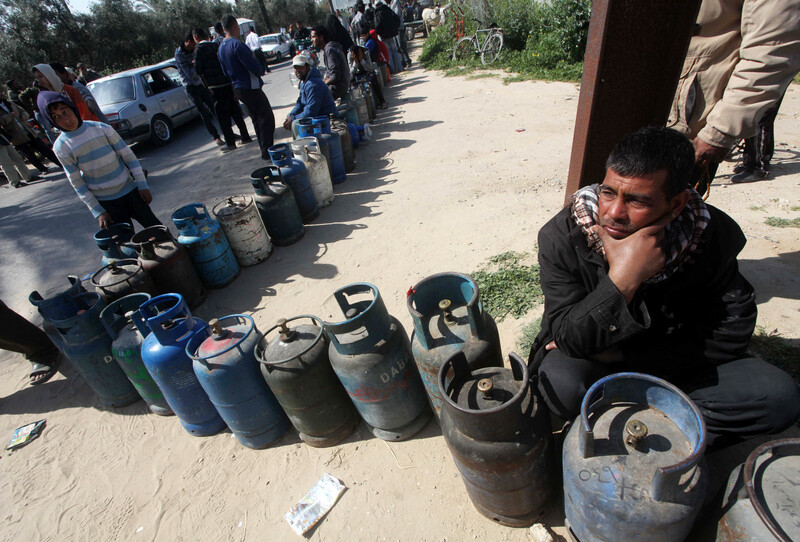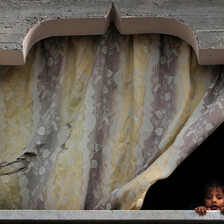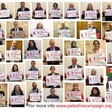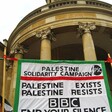The Electronic Intifada 11 April 2012

According to the BBC, Palestinians in Gaza are accustomed to a state of constant siege.
APA imagesWatching, reading or listening to a BBC report on Israel’s occupation of Palestine is like stepping through the Zionist looking-glass and witnessing not the reality of the situation, but Israel’s totally distorted version of it.
In this inverted world, presented to us by a broadcaster with a huge global reach, we were recently told that the besieged people of Gaza have become accustomed to the relentless violence and deprivation of Israel’s occupation and siege, while the residents of southern Israel continue to feel anxiety and dread when crude rockets are fired into their neighborhood.
These extraordinary claims are made in two juxtaposed articles published on one page recently on BBC Online (“Gaza-Israel clashes: The view from each side,” 13 March 2012).
They perfectly encapsulate the BBC’s general attitude towards reporting on the occupation — reporting which, with sad regularity, lacks truth, honesty and integrity.
Published just after Israel had bombed Gaza continuously for four days, killing 27 Palestinians including children as young as seven, the headline for the article about Gaza reads, “Gazans ‘inured’ to conflict.”
This incredible opinion — that the people of Gaza have become used to the mass killings visited on them by Israeli airstrikes, to the destruction of their homes by F16s, to the suffering caused by near-total blockade, to the restrictions on their freedom and movement, to the daily terror of drones flying overhead — is that of the BBC’s correspondent in Gaza, Rupert Wingfield-Hayes.
No evidence
An experienced journalist, Wingfield-Hayes provides no evidence for his article from official sources such as the United Nations or Palestine Trauma Centre, which produce factual reports on the high levels of mental health problems amongst the population. Nor does he interview any Palestinians in Gaza on whether they have become habituated to the Israeli bombs which fall on their homes and incinerate members of their families in order to back up his headline-making claim.
Instead, the basis for his assertion is that, while Israeli warplanes fly overhead as he sits in a building in Gaza City, “down below on the streets the cars kept passing, the shops stayed open, pedestrians kept walking home with their groceries.”
And so, because people continue trying to survive amidst the destruction, the BBC presents them as being “inured” to the violence and injustice that is rained down on them on a daily basis. This public broadcaster, paid for by the UK taxpayer, denies the Palestinians even the luxury of sharing the same human feelings of terror, frustration and longing for freedom that everyone else on the planet is allowed to possess. Described as being “inured” to a situation no sentient human being could become used to, they are, essentially, deemed less than human.
Making the siege invisible
Wingfield-Hayes also renders invisible Israel’s five-year siege, with not even a brief description of the desperate situation currently facing Palestinians in Gaza, as supplies of fuel and cooking gas near exhaustion, electricity is available only six hours in every 24, hospitals cancel operations, schools and universities close, and families resort to candles for light and ancient clay ovens, lit with straw and wood, to cook food.
Is this because reporting honestly on the siege and its effects might elicit sympathy, even understanding, for the Palestinians and clash with the image Israel wants the media to project of a terrorist population threatening its security?
Was a desire to present Israel’s singular view of international law also the reason behind the article’s original claim that the occupation of Gaza had ended in 2005? A written complaint from the Palestine Solidarity Campaign directing the BBC’s Middle East editor to UN resolutions on the matter resulted in a paragraph being added to say that Israel still maintains control over Gaza’s borders and airspace.
Astonishing and inept
Nevertheless, Wingfield-Hayes’ extraordinary questioning of an unfortunate Palestinian in Gaza remains in the modified article. “What do you mean when you say you are struggling against the occupation?” he demands of a man who does not have the freedom to move beyond an area of land measuring 25 miles by 4 miles, whose every aspect of life, including whether he will be allowed enough food to keep his family alive, is controlled by Israel. “After all Israel pulled out of Gaza in 2005,” Wingfield-Hayes insists.
This is quite astonishing and, taking into account Wingfield-Hayes’ failure to mention the siege which dominates this man’s life, journalistically inept.
The subconscious message this article is sending out, by denying the desperate reality in Gaza in favor of groundless, unsupported theories put forward by the journalist, is that Palestinians in Gaza are ok, there’s nothing to worry about, you can look away.
This is in stark contrast to the article which runs parallel to it, headlined “Israel’s Iron Dome hopes.” In this piece, the BBC’s Kevin Connolly tells us how “normal life” in southern Israel is “severely disrupted” during periods of rocket fire. He provides us with emotive descriptions of the “anxiety” of the Israelis as they go through “grimly familiar rituals” on hearing “the mournful howling” of sirens and describes a young man running in fear for shelter. We learn about “that familiar sense of dread” experienced by the residents of southern Israel and their hopes that the Iron Dome missile shield will become an “instrument of deliverance” from Gaza’s rockets.
These are clearly not people, Connolly is saying, who are inured to conflict. So why, according to the BBC, do they still feel dread and anxiety and not the Palestinians? Are the Palestinians simply hardier, or are the F16s, Apache helicopters, armored tanks and drones deployed against them just not as frightening as the homemade rockets which terrify the Israelis?
Leaving Wonderland
Connolly’s article focuses on the image of the Israeli state defending itself from the besieged, refugee population of Gaza. As with Wingfield-Hayes’ contribution to “the view from each side,” there is absolutely no mention of the fact that Israel illegally occupies Gaza, has held it under tight siege for six years, committed a massacre of 1,400 people there during three weeks in 2008-09, shoots from remote-controlled watchtowers at Palestinian children collecting rubble and from gunboats at fishermen trying to catch fish to feed their impoverished families, and no mention at all that Israel violates international law every single day of the year in relation to Gaza and the Palestinians.
Connolly talks about the levels of “military balance” between the Israelis (funded to the tune of $3 billion a year in military aid by the US) and the Palestinians (a people with no state and no army). Wingfield-Hayes implies, when he interviews a man whose house has been reduced to rubble by an airstrike, that the Palestinians have brought their collective punishment upon themselves by standing up to Israel and refusing to accept their occupation.
As a BBC journalist who has been asked to step through the Zionist looking-glass, he does not of course tell his audience that, under the Geneva convention, collective punishment is illegal or that international law allows an occupied people to resist their occupation.
To do this would mean leaving Wonderland and stepping back through the looking-glass and into reality. This is something that the BBC, with its twisted, fact-free reporting of the occupation loaded in favor of Israel, seems incapable of doing. After all, this is the same organization which has declared that “Palestine doesn’t exist” while simultaneously warning that to claim it isn’t free is a contentious issue. And with the BBC’s reach extending into every corner of the globe, this inability — or unwillingness — is something that should concern us all.
Amena Saleem is active with the Palestine Solidarity Campaign in the UK and keeps a close eye on the media’s coverage of Palestine as part of her brief. She has twice driven on convoys to Gaza for PSC. More information on PSC is available at www.palestinecampaign.org.






Comments
The twisted Zionist portrayal of Palestinians
Permalink Mark Behrend replied on
Amena Saleem's piece on the BBC's Zionist slant reminds me uncomfortably of a PBS retrospective on the life of CBS newsman Mike Wallace, who died over the weekend.
In a Charlie Rose interview of Wallace from nine years ago, Rose played a clip of Wallace's much older, and highly negative interview of Yasir Arafat. Supposedly to prove that his sentiments therein were strictly anti-Arafat, Wallace went on to heap an odd sort of praise on Palestinians as whole, noting that, even though he grew up in a Zionist, Jewish household in Brooklyn, Wallace felt great sympathy for Palestinians, whom he described as a "smart," overachieving people, who (without a hint of irony) he added the ultimate compliment, calling them "the Jews of the Middle East"!
Suggesting a further parallel with real Jews, he went on to point out the perpetual victimization of Palestinians -- even by other Arabs, such as the Lebanese and Syrians, who "threw them out," forcing them to live indefinitely as refugees.
And Charlie Rose, a mouthpiece of the same, inverted logic, knowingly smiled and nodded his assent. Not a word of correction to point out that it was Israel's "Jews of the Middle East" who drove Palestinians into Lebanese and Syrian refugee camps, with a massive army and occasional air strikes to make sure they stay there.
Nor did Rose raise the larger question: If Palestinians are "the Jews of the Middle East," then who are the Israelis? The Jews of Brooklyn, London, Melbourne, and Paris, who live in Palestine because they can't find their way home?
Great Article
Permalink marc replied on
great work Amena, keeping objectivity and professionalism in such a touchy issue
BBC bias
Permalink desertson replied on
A wonderful article by Amena.
Yes, Amena, an excellent
Permalink Sue replied on
Yes, Amena, an excellent article. So glad that you're monitoring the BBC for us. I have to admit that I never go on their website having lost faith years ago so am completely reliant on your vigilance. Thank you.
And the word "Palestinian" also avoided
Permalink Ark replied on
The BBC have invented a new people called the "Gazans". The word Palestinian was not used one in the body of either article (just in one image caption, presumably added by an editor rather than the author).
Great Work
Permalink Mohammed Mansour replied on
After your permission, your beautifully-written article will be translated into Arabic...can I do that?
Yes, of course, Mohammed.
Permalink Amena Saleem replied on
Yes, of course, Mohammed. Thank you very much. (Apologies for the late reply - I've only just read your comment)
BBC's Art of Distracting the Viewers/listeners
Permalink Khosrow replied on
Britain's 'impartial' BBC is renown for its own brand of impartiality: not only in its reporting style and terminologies but in its art of DISTRACTING the listeners/viewers from the crimes committed by the Zionists: e.g: during the Israeli military attacks on the civilians in Lebanon: in addition to the weekly programs on WWII (meaning nothing but the Holocaust), there was a daily episodes of 'The Diary of Anne Frank', shown in parts! that is 40 minutes every night of the week so the viewers were urged to remember the suffering of the Jews or ‘victims of history’ (for modern audience, the Zionists Israelis) while Israeli army was murdering women and children every hour and the BBC radio stations were saturated with programs about the Jews whose families had perished during the Holocaust: from interviews with Jewish musicians and artists connected to the Holocaust to reviews of books written/edited by the Jews who would speak of the suffering of the Jews as though we were still in the 1930s and 40s; even the desert island disc program! and more astonishing special programs came on by "elderly Jewish women in Austria" recalling their sufferings during the Holocaust! the whole week the Israelis were massacring the civilians in Lebanon and Tony Blair was sending more Apache helicopters to Israel the BBC was urging us to mourn for the suffering of Israelis – that is the BBC's impartiality par excellence!
BBC bias
Permalink roger iredale replied on
Amena covers the ground with her usual penetrating observation and adds yet another nail to the BBC's coffin. It is outrageous that the British TV watcher is compelled to subscribe to this free propaganda outlet through the licence fee which is collected under the false pretence that the BBC is unbiased and objective.
BBC Bias
Permalink Mary Edwards replied on
You are not compelled to watch the BBC. Take action and cancel your licence! As well as Sky. There is much more to the world than these biased media channels will have you believe.
How BBC views Gaza
Permalink Khalid Mehmood replied on
A objective analysis beautifully written.BBC is becoming voice of the Zionists.I have stopped watching question time aswell.
Facts /Truth/ Integrity
Permalink Mhara Costello replied on
If there were a badge of honour awarded for accurate, intelligent, sensitive, professional and incredibly moving reporting, this article wins hands down.
It should be compulsive reading for every BBC / Radio Four interviewer -producers / presenters alike; not least, Wing field Hayes, who might just learn a thing or two. He ain't fit to lick your boots, Amena. Thank you.